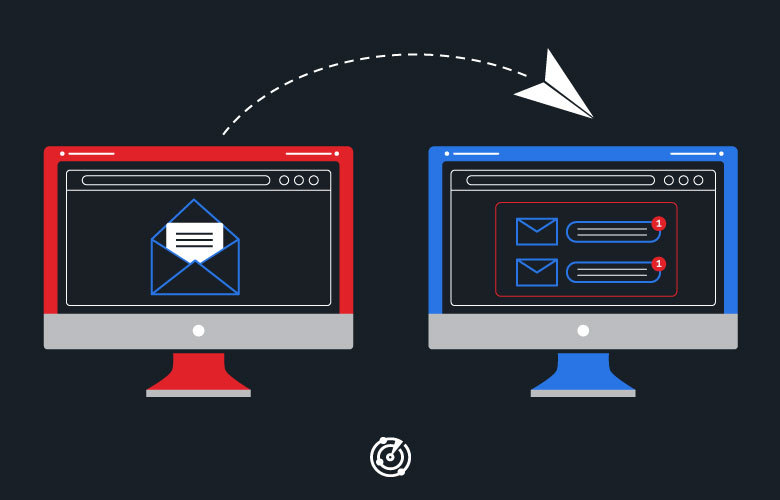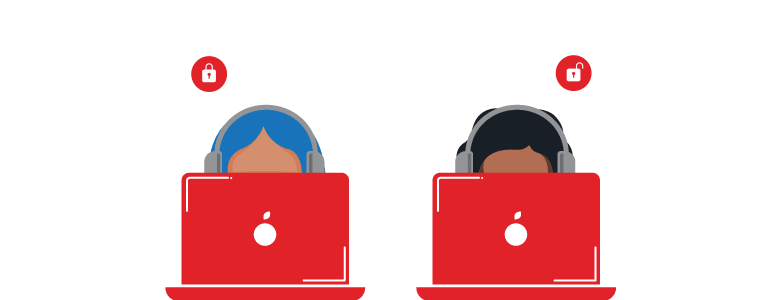September 28, 2021
How to Create an Anonymous Email Account
Sending a truly anonymous email goes far beyond having strong encryption. Everyday email service [...]

WHAT’S IN THIS REVIEW?
Disclaimer: Partnerships & affiliate links help us create better content. Learn how.
The evolution of email began as a test by Ray Tomlinson in 1971 who successfully sent the first network email in history. It has since grown to be a common necessity with over half of the global population owning 3.9 billion active email accounts. Throughout this time, email has made promising advancements from the preliminary stages of AOL, Delphi, Hotmail, and Outlook 97 to the more mature stages of Gmail, Outlook, and Yahoo Mail.
I’m not here to judge—but if you’re still in the dated email pool of AOL or Hotmail, then I strongly advise you to upgrade to a more modern service. I say this because let’s be real, can you actually trust someone with a telephones_and_computers_rock@hotmail.com email? (And yes, this was a real email—my email back in the early 2000s.)
It’s common to believe that a strong email password is going to keep your messages private and protected. But in reality, email is a common target for cyber breaches from hackers, identity thieves, and phishing scams. So, how do we protect ourselves from these crimes?
Answer: Sign up with a service that offers email encryption.
Encryption is an integral part of sending and receiving confidential emails. And since email is constantly used as a means to communicate, email encryption stands as a necessary practice worth implementing.
I understand it can be easy to settle for Gmail as your prime email service, but by no means should you label them as a secure provider. In fact, Gmail allows third-party services to secretly peep through your emails to serve targeted ads. Not only that, but it uses its own ecosystem of services to collect copious amounts of data on you. Along with large tech corporations, hackers can intercept and read your private messages. If you’re sending confidential information like passwords or your address through a non-encrypted email, then you’re holding yourself vulnerable to a dangerous cyber attack.
Securing a message with email encryption essentially disguises the content within your message. This protects confidential information from being intercepted by unintended recipients. An encrypted email is often protected through authentication with public and private keys. When sending an email with sensitive details, you use your desired recipient’s public key to encrypt the message. They then use your private key to decrypt the message and reveal the email’s contents.

Now, I’m not saying all of this to scare you and hype up the need to buy expensive software for proper email encryption and security. Instead, I’m here to raise awareness about cyber threats and equip you with the tools and knowledge necessary for prioritizing your right to privacy.
There are a variety of email services whose features focus on email encryption. But we did all the research and narrowed it down to 5 trustworthy and secure services. Each having the power to keep snoopers and third parties out of your inbox.

With over 1 million active users, ProtonMail has made a name for itself as a prominent leader in the email security industry. Even they cannot decrypt your messages and therefore keep your data safe from third parties and dangerous cyber threats. Their subscriptions include a free tier along with 3 upgraded tiers for an additional cost.

Tutanota is a high-grade email encryption service that utilizes symmetric and asymmetric encryption technology. They encrypt emails from end-to-end when both parties are active Tutanota users and allows them to send password-protected emails to non-users. Their subscriptions include a free tier, 2 upgraded paid tiers, and the option to add on extra storage space.

PreVeil is another top contender in the email security space. Not only do they encrypt emails end-to-end, but they also offer PreVeil Drive—their cloud storage feature for sharing encrypted files. Like ProtonMail and Tutanota, PreVeil offers a free tier but their plan includes more with 2 GB of storage.

PrivateMail is a reliable and secure email encryption service for personal and business users. They offer an extensive suite of features, including end-to-end encryption, file syncing across multiple devices, and mobile contacts syncing. They don’t have a free subscription, but you can start using their service starting at $8.95 per month.

The final platform we recommend checking out is SecureMyEmail—an easy-to-use email encryption service for everyone. They make it simple to manage and control all your email accounts and security keys with no binding contracts. Use it for free, with one email and no feature limits. Or, sign up for a 30-day free trial for additional email accounts.
There are many different components needed when it comes to privatizing your emails. But each of these 5 reliable services does all the work and makes it easy to accomplish foolproof email security. If you want to keep snoopers, hackers, and third parties out of your inbox, then try one of our recommended email encryption services! And for even tighter privacy and security, consider pairing your new email account with a secure VPN, tested and reviewed by our VPN experts.
| Cookie | Duration | Description |
|---|---|---|
| __cfduid | 1 month | The cookie is used by cdn services like CloudFlare to identify individual clients behind a shared IP address and apply security settings on a per-client basis. It does not correspond to any user ID in the web application and does not store any personally identifiable information. |
| cookielawinfo-checkbox-advertisement | 1 year | The cookie is set by GDPR cookie consent to record the user consent for the cookies in the category "Advertisement". |
| cookielawinfo-checkbox-analytics | 1 year | This cookies is set by GDPR Cookie Consent WordPress Plugin. The cookie is used to remember the user consent for the cookies under the category "Analytics". |
| cookielawinfo-checkbox-necessary | 1 year | This cookie is set by GDPR Cookie Consent plugin. The cookies is used to store the user consent for the cookies in the category "Necessary". |
| cookielawinfo-checkbox-non-necessary | 1 year | This cookie is set by GDPR Cookie Consent plugin. The cookies is used to store the user consent for the cookies in the category "Non-necessary". |
| cookielawinfo-checkbox-performance | 1 year | This cookie is set by GDPR Cookie Consent plugin. The cookie is used to store the user consent for the cookies in the category "Performance". |
| viewed_cookie_policy | 1 year | The cookie is set by the GDPR Cookie Consent plugin and is used to store whether or not user has consented to the use of cookies. It does not store any personal data. |
| Cookie | Duration | Description |
|---|---|---|
| cookielawinfo-checkbox-functional | 1 year | The cookie is set by GDPR cookie consent to record the user consent for the cookies in the category "Functional". |
| cookielawinfo-checkbox-others | 1 year | No description |